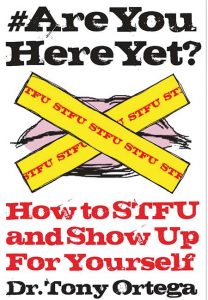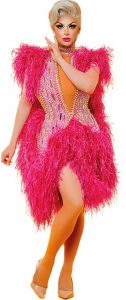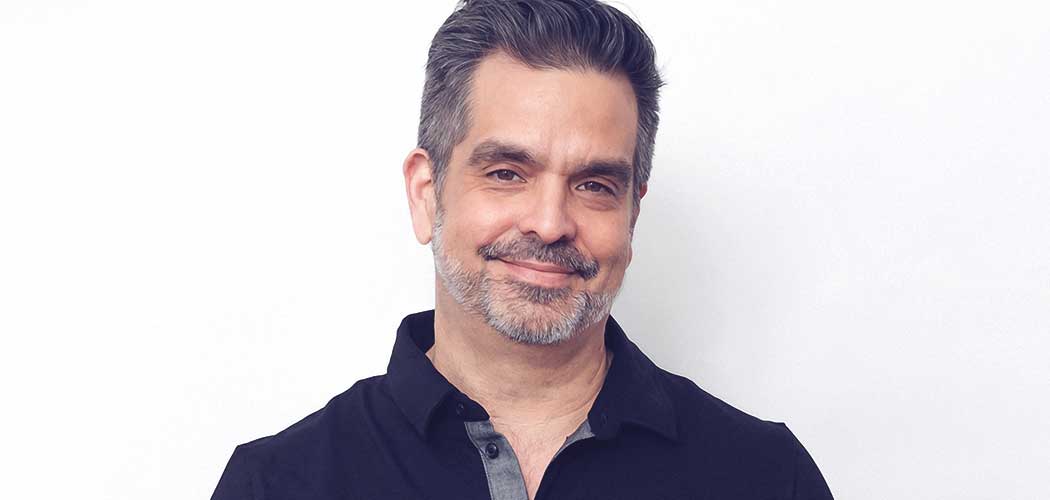Dr Tony Ortega is a clinical psychologist, dating and relationships expert and self-help author and will be releasing his second book on Valentine’s Day. Dr Ortega, a first-generation Cuban American, has been in practice since 1992, currently serving the LGBTQ population in his private practice located in Brooklyn, New York. He will be in London this month to launch his latest book #AreYouHereYet? How to STFU and Show Up For Yourself. We caught up with Dr Ortega before his UK visit and asked him what his approach to personal improvement is all about.

Is your key point in ‘#AreYouHereYet?’ that personal improvement starts with you, and not with gurus or self-help books?
While this is certainly one of the main messages, the tone of the book goes beyond gurus and self-help books. In general, we have become folks who rely on external means to provide validation in our lives. No one knows that better than a gay man like myself. So the book holds a mirror to the reader’s face and forces them to take a rigorous look at themselves and ask the question, “Are you here yet?” It will remind them of what they are capable of already if they just stopped and reached into themselves to achieve what they want in life. So the answer to the question “Are you here yet?” will likely be a yes when the reader finishes the book.
You are an advocate of ‘staying in the present moment’, how can we do that in such a busy world of mobile phones, social media, city life in London etc?
Well I’ve only had the pleasure of being in London once in my life (soon to change though) however, being a New Yorker, I think it’s a very similar lifestyle. Staying in the present moment is truly a lifestyle change that needs daily work and evolves over time. This can be done regardless of any circumstances. The deciding factor is making that conscious choice to be more present in our own lives. Social media and technology has slowly changed us into mindless drones. Social media and technology do everything for us. It now uses us instead of we using it. This is where awareness of what you want your life to look like comes in and the choice to be a more active and a present participant in it.
And while we live in big cities and we are always on the go, this does not negate the ability to take five minutes and breathe, while being aware of where we are at this very moment. We may forget we can do this as our to-do list grows exponentially. The best weapon is to set the intention upon waking every morning to stay present to the best of your ability. We can plan the plan but not plan the outcome.
Can you tell us about your ‘OMG Moments’?
This is actually a great story that I’ve never really talked about. I’m an avid reader myself. Whether I’m reading a physical or digital copy, I like to highlight certain things that really speak to me. I then thought, “Hey, wouldn’t it be cool if the author did the highlights for us?” I say this not in the way of creating laziness. The author would lead the reader to what they feel are the important and salient points in the chapters. It can later be easily referenced by the reader. This lead to the “Miracle Moments” in my first book #IsHeHereYet: Being the Person You Want To Be With. And now, with my new book, I titled it “#OMGMoment” for two reasons: hashtags grab our attention and OMG infers that we had a moment of revelation.
How can a Boyz reader use your book to change his life and maybe get over issues like chemsex, Grindr/app addiction, throwaway sex etc?
I feel very strongly that by reading the book, answering the Tea Time questions with vigorous honesty, and implementing the tools (The Utility Belt Strategies included in every chapter), readers will feel a shift in how they typically perceive themselves, others and their reality. With gay men, the rigorous work of showing up for oneself will start to change our typical patterns of operating in the world. Without shaming sex and body positive gay men, a good percentage engage in obsessive/compulsive/repetitive behaviours such as chemsex, Grindr/app addiction and throwaway sex as a means of coping with internalised shame, as well as sadness and anxiety.
The material in the book challenges the reader to look at their motives for engaging in any behaviour, including the aforementioned. The book also normalises negative human experience in a way that would allow gay men to not feel so different from their heterosexual counterparts. And come on, what gay man does not want to read a book with sprinkled references to RuPaul’s Drag Race, talks about Channing Tatum naked on a regular basis and concludes with Betty White’s unofficial, unsolicited and unauthorised guide to life?
What does ‘walk the runway like you own it’ mean in terms of our feelings of anger or sadness or loneliness?
Any fan of RuPaul’s Drag Race knows that the main challenge involves the runway. If the queens do not walk that runway like they own it, the judges will usually clock them on that. This does not imply any kind of falsity in being but an acknowledged sense of knowing their worth despite any odds facing them. One of my favourite queens, Adore Delano, (in the first episode I ever watched – Season 6 Episode 1 – Adore was the first one out so I may have imprinted on her) made it to the top three in her season. If you go back and look at her performances, she didn’t always nail the challenges. Yet, every time she walked that runway (even with the fear that Michelle Visage would clock her for something), she owned her aesthetic and presented it powerfully as a contestant. It may not have met Ru’s or Michelle’s expectations but she was Adore until the very end. We can do well to borrow a page from Adore.
When we walk the runway of life, we need to own all aspects of ourselves, positive and negative. When the negative is pointed out by someone, we can simply say “thank you” and decide to do better next time or not. Conversely, we can be in full awareness of our strengths and triple down on those. The book talks about allowing two emotional processes to co-occur: negative and positive (and if not positive, at least neutral). We can honour our feelings of sadness or anger or loneliness and still walk around in full awareness of the superstar we are despite these negative emotions and experiences. Adore is one of many RuPaul’s Drag Race queens that exemplify this.

Can you tell us about the ‘Tea Time with Tony’ section in the book?
In my 52 years of life and 27 years as a mental health professional, I have consumed a plethora of mental health/psychological/self-help books. I always found one thing lacking in a large percentage of the books I have read – they never provided practical and personal application of the techniques and theories they expounded upon. I was always left with the feeling of, “this stuff is cool. How could it look like in real life or even my life?” While the discovery of that question led to many adventures and misadventures, it would have been nice if I were to have been given something a little more personalised. Sometimes, the material out there is too lofty and heady. My purpose in Tea Time with Tony (and in the Makeover Moments in my first book) is to provide the reader with a street level, practical and personal application of the themes and techniques in the chapter. The reader can also think of sitting down with me as I serve the tea as I do with my clients in my office.
What is the ‘Drama Queen Syndrome’?
Without getting too diagnostic, the Drama Queen Syndrome is a tendency to magnify what we experience to garner attention from others and avoid taking any responsibility for our own well-being. You can spot a person “suffering” from DQS by the way they talk and act. Their verbiage is one of absolutes. Everything is either ALL good and ALL bad. There’s never any middle ground with them. You could say that someone with DQS needs to have attention on them to feel wanted. It certainly doesn’t meet the criteria of what us professional mental health folks consider Histrionic Personality Disorder but it’s a distant cousin. A DQS person will say things like “I’m suffering from …” instead of something like “I feel like shit.”
While I would never invalidate someone’s experience, as a mental health professional, it is my job to confront clients on ways of being that aren’t working for them. I work with my clients on the words they use to describe their emotional experiences. Asking clients to change the words they use from an absolute to something more objective, the drama (I use this term purely as an adjective and not to shame anyone) de-escalates almost immediately. One of the building blocks in my clinical practice is “Change your words and you change your life.”
Can you tell us about your Utility Belt tools you mentioned?
This idea came to me as a New Yorker. When I lived in Florida, I drove everywhere. Therefore it was easy to keep pretty much all I would need for the day in my car. Living in NYC and using the subway 100% of the time, I’m limited in what I can carry on my person. Part of my self-care involves foods, liquids, oils, and crystals (yeah I’m one of those queens). After years of feeling frustrated with my limited ability for storage while commuting, I thought to myself, “I need to be more like Batman” and just started to carry the essentials much like Batman does with his utility belt. It then dawned on me we could have psychological utility belts: tricks and tools we can carry with us that we can pull out even on a crowded subway train. When you can’t reach for something physical, you can reach for something psychological with the Utility Belt Strategies.
You write that social media ‘has turned us into a bunch of basic bitches’, can you tell us how we can navigate social media without that happening? Is it all about comparison?
The worst thing to come out of social media (second only to influencers) is the tendency to compare. I know as a gay man, my ruler comes out when I’m scrolling through the social media pages of scantily clad dudes. Even the term “influencers” implies comparison. How could they influence us if we did not compare ourselves to them and the lives they portray on social media? This is why they work so well. Now, having been behind the scenes with some influencers, I have become privy to what they are really all about and it is rarely the glitz and glamour they would lead you to believe they have.
The reason I use the term ‘basic bitches’ is to really call attention to how we are not showing up for ourselves in our consumption of social media. Not showing up for yourself is basic AF. If we were to use social media more for entertainment and/or information, we’d increase our ability to show up for ourselves. The book takes the reader on a journey to the real and essential you. There’s nothing basic about that and this ‘you’ does not engage in comparison. This ‘you’ knows who you really are and comparing yourself to someone with 10K+ followers isn’t one of them. I believe this real and essential you is present in all of us.
Can your book help us find a boyfriend if we’re single?
Oh gosh. In three years, I’ve written two books and I’ve been single the entire time. However, the greatest gift I’ve given myself in this three year journey is that I have FINALLY gotten 100% okay with who I am and how I want to show up in the world. This allows the ground to be more fertile and receptive for that right person to come in. So can reading this book help the reader find a boyfriend? Yes and no. To be cheesy, I feel the reader can find the boyfriend within to them create space for an external boyfriend. The book will shift the NEED for a boyfriend to a WANT. This essentially makes all the difference.
What is the best way to enjoy a relationship with a partner – you talk about complementing not completing your life?
Personally and professionally, I have seen many folks get into relationships because they don’t feel complete unless they have one. I have been guilty of this myself in the past. This tendency to need someone romantically to complete you can have disastrous results as the incomplete person may end up with a person who takes advantage of them because of this.
One of the healthiest ways of approaching relationships is from a place of “I am whole and complete.” You have a full life in of yourself. Now, the relationship adds value (and hopefully lots of good sex) to your already amazing life. The best way to enjoy your relationship is to be in full awareness of the fact that you both are whole and complete human beings who are coming together to add to each other’s lives and not fill any voids.
What is the main message you would like Boyz readers to take away from your book?
Speaking as a gay man who lived in the 80s, in a conservative Catholic household, and at the start of the AIDS epidemic, I always felt there was something wrong with me. It was like this internal wound that would never heal. Through various points in my life, I tried to heal that wound through self-help stuff, drugs, alcohol, and men. I hit an emotional bottom and realised NOTHING outside of myself was going to permanently feel whole and complete. The moment I really internalised this belief and did the work (much of which is outlined in the book), my life went from good to fucking fierce. That’s not to say that the wound doesn’t rear its ugly head from time to time and want to tell me what a shit person I am. These days, the voice of the wound is much like a murmur instead of a scream.
To the readers of Boyz magazine, I may not know you personally, however, I know this – we don’t need anything outside of us to make us fierce, fabulous, powerful and amazing creatures. We already are. We need to be present to our own power and uniqueness and walk the runway of life like we were just crowned America’s Next Drag Superstar.

Dr Tony Ortega is the author of #AreYouHereYet? How to STFU and Show Up For Yourself (Ortus Press, Free Association Books), £11.99, available online and in all good bookshops as a paperback and eBook. Dr Ortega will be in the UK from 12 to 18 February with the #AreYouHereYet? book launch on 13 February in Soho with guest Cheryl Hole.















